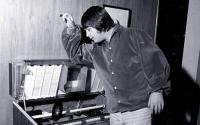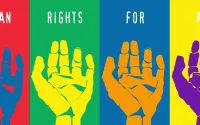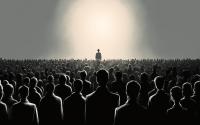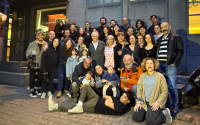By Yasuhiro Mori
TOKYO, April 27, Kyodo - Unassuming, humorous and possessing a single-minded personality, Wang Meng is highly respected in China as one of the country's literary mainstays. After his conviction in the 1960s as a ''rightist,'' Wang moved with his family to the Xinjiang Uighur Autonomous Region in China's far west until his rehabilitation in 1979. During this time, he threw himself into studying the Uighur language and met many Islamic students, while maintaining his natural generosity in advocating ''affection and concern for other minority people.'' His writing, which draws on his abundant experiences of living with minority people, are powerful expressions of his perspectives on life and his search for beauty in the world. Traveling the United States one month after the Sept. 11 attacks had decimated the World Trade Center, he found himself in a country where blind patriotic sentiment was on the rise led by a ''childish'' President George W. Bush, fueling his concerns over the uni-polar nature of U.S. dominance. The following are excerpts from an interview with Wang Meng in Tokyo. -- At the time of the terrorist attack, did you think back to your Xinjiang friends? Of course. I have many friends in Xinjiang who are Islamic believers. To be honest with you, all of them were very calm about the whole thing. I am very close to them. We often chatted, drank and generally enjoyed each others' company. They liked to use the Uighur expression, ''Our hands are soft.'' This means not thinking about taking extreme actions. During the Cultural Revolution, young students in China divided into two factions. In extreme cases, they even fired at each other with guns. The Uighur people really couldn't understand this. ''Why do you have to bring guns into a political dispute?'' they asked. -- But in Xinjiang there are extremist independence groups, aren't there? Can terrorists rise from even among a temperate-minded minority people? One of the reasons for this is related with the international background. Osama bin Laden and the Taliban are really fanatical and extremist. A group of Xinjiang extremists did receive training from the Taliban. There have also been incidents where buses were blown up in the Xinjiang capital of Urumchi, and during the past few years numerous cases have been uncovered of weapons being smuggled into Xinjiang. -- How do you view the United States' reaction to the terrorist incident? A week after the start of the offensive in Afghanistan, which was a month after the terrorist attack, I visited the United States to attend a symposium. Titled ''America During Wartime,'' it was imbued with patriotism and everyone was united in their hostility towards the common enemy. Everywhere there were slogans stating ''United, we will win'' and I saw many people wearing T-shirts with illustrations of bin Laden saying ''Wanted: Dead or Alive.'' Even small restaurants run by Chinese people were displaying the national flag. The rise of patriotic feelings to such a level precludes any form of debate. In the United States, which prides itself on freedom of expression and debate, both now seem very difficult. President Bush's call to ''wipe out'' all of the terrorists is very childish. I also think terrorists are evil, but if you want to wipe out all of them the problem is how you do this? -- What about the causes of terrorism? Global capitalism's vitality lies with free competition. Without free competition, science, industry and economics would not have advanced to today's levels. However, competition also comes with a price. The people who win are happy. But the people who lose fall into miserable circumstances. These sort of people are poor and backward, and (without the benefits of) science and technology they are unable to realize their hopes. Those at their wit's end will do dangerous things. Two thousand five hundred years ago, Lao Tzu said that according to the rules of nature, surpluses should go to those with shortages, but that in the world of people those with little find themselves with increasingly less. As the laws of the world of people often oppose those of nature, the impoverished are often exploited and oppressed. Furthermore, as Lao Tzu said, those who are not afraid of dying remain unaffected by threats of death. The question is how can the winners of competition help people who are impoverished and backward, and sometimes foolish? I think in this question lies the way in which terrorism can finally be eradicated. Another problem lies with the uni-polar nature of the world. In the past, it was a bi-polar world, centered around the United States and the Soviet Union. At that time, people opposed to the United States pinned their hopes on the Soviet Union and affiliated Socialist states, while those opposing the Soviet Union put their hopes with the United States and North Atlantic Treaty Organization (NATO) countries. Then at least there was hope (for dissenters). Now U.S. power has been strengthened so much that the world has become uni-polar. Anti-U.S. individuals and groups have no hope of overcoming the United States. Hasn't this then led some people to experience a loss of hope and an inclination to extremist action? -- How can countries with different religions and viewpoints exist together? In the 21st century, it is impossible to stop the trends of globalization sweeping through economics, industry and science and technology. This is because of the benefits gained from economic development. China has become a member of the World Trade Organization and entered the process of globalization. However, cultures cannot consume other cultures. Culture depends on our existence. Cultural identity means that Chinese people are Chinese and Japanese people are Japanese. It was under these conditions that Samuel Huntington put forward his ''Clash of Civilizations'' thesis. At the time when the terrorist incident occurred, the foreign affairs committee of the Chinese People's Political Consultative Conference CPPCC (a government advisory group) was holding a symposium entitled ''Dialogue between Civilizations.'' One of the attending United Nations officials said the terrorist incident was an indication of a clash between civilizations. But Huntington himself has denied this. The interpretation of the incident as being a ''clash of civilizations'' would indeed cause complications. This would be equivalent to recognizing the United States as forming one side and the entire Arab and Islamic world forming the other. If the United States came to see the whole Arab world as its enemy, it would be unable to pursue its fight against terrorism. It is not a case of the whole Islamic world engaging in terrorism. Those responsible are a very small number of extremists. I support ''dialogue between civilizations,'' as advocated by Iranian President Muhammad Khatami. A large number of exchanges and attempts to reach mutual understanding must lead to greater understanding. -- The cultural exchanges with the minority people in Xinjiang really provided you with an enriching experience, didn't they? I think when considering minority people, first it is necessary to have appropriate respect for other people's values. Second, forms of affection and concern are essential. This is not always pleasant. The world certainly is diverse. The Uighur people speak Artai, which is part of the Turkic language group, and it is completely different from English. Their singing, music, dancing and daily lives are really interesting. Islamic people pay particular attention to washing their hands, which they do in the mornings, evenings and before every meal, sometimes even during the course of a meal. I think the Han Chinese must learn about washing hands from the Uighur people (laughs). We are not so fastidious about washing our hands. Of course, there are also good things about the Han people, such as our inclination to work hard and economize. Even if Han Chinese people are very poor and earn only 100 yuan ($12) a month, they will spend 70 yuan and tighten their belts in order to save 30 yuan. Uighur people can't do this. If they earn 100 yuan they will just spend it all without thinking about the future (laughs). -- Among your works you have written about an old, foolish Islamic believer. The old man I wrote about is very honest in his good-natured personality and simplicity. He receives all his education from an ''ahon'' (religious teacher) at a mosque. He doesn't believe that the transistor radio was invented by people, but that instructions to build them are written in the Koran. He also flatly refuses to believe that the Apollo 11 landed on the moon, as it is ''written in the Koran that the distance between the earth and moon is such that you would be unable to reach it even after riding a racing steed for 40 years.'' However, we can get rid of such foolishness. Since I am a Han Chinese sometimes Uighur people didn't believe what I said, but believed the same thing from a Uighur intellectual or cadre. It made me a little bit sad (laughs). While living with minority people, there was sometimes friction and misunderstandings and we sometimes had big debates. But this was all natural and actually quite enjoyable. I would really hate to see such differences turn into violence. Biographical note: Wang Meng was born in Beijing on Oct. 15, 1934 and joined the Chinese Communist Party in 1948. In 1958 he was deprived of his party registration among criticism of his first book, ''The Young Newcomer in the Organization Department,'' published in 1956 as a rightist faction. He was then forced to work in the villages of Beijing's suburbs for five years before moving, at his own request, to the Xinjian Uigur Autonomous Region with his wife and children in December 1963. He spent 16 years there. After the decade-old Cultural Revolution period Wang was rehabilitated in 1979 and returned to Beijing. He was member of the party's Central Committee from 1985-1992 and was named culture minister in 1986. His other major literary works include ''Long Live the Youth'' (1957), ''Bolshevik State: A Modernist Chinese Novel'' (1979), ''The Barber's Tale'' (1979), ''A Night in the City'' (1979), ''A Spate of Visitors'' (1980), ''The Butterfly'' (1980), ''The Metamorphosis of Human Nature'' (1986), ''Adventures of a Soccer Star'' (1990), ''You Can Come into My Dream Again'' (1991) and ''The Dream of Red Mansion'' (1991).
http://home.kyodo.co.jp/all/printer_friendly.jsp?an=20020427060






